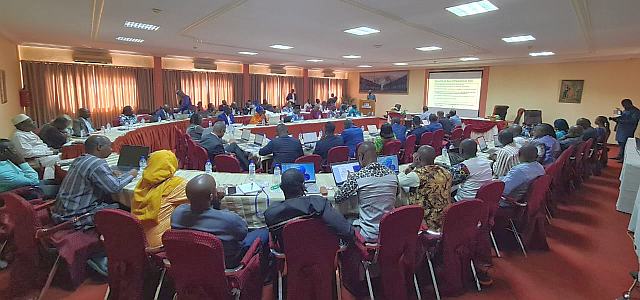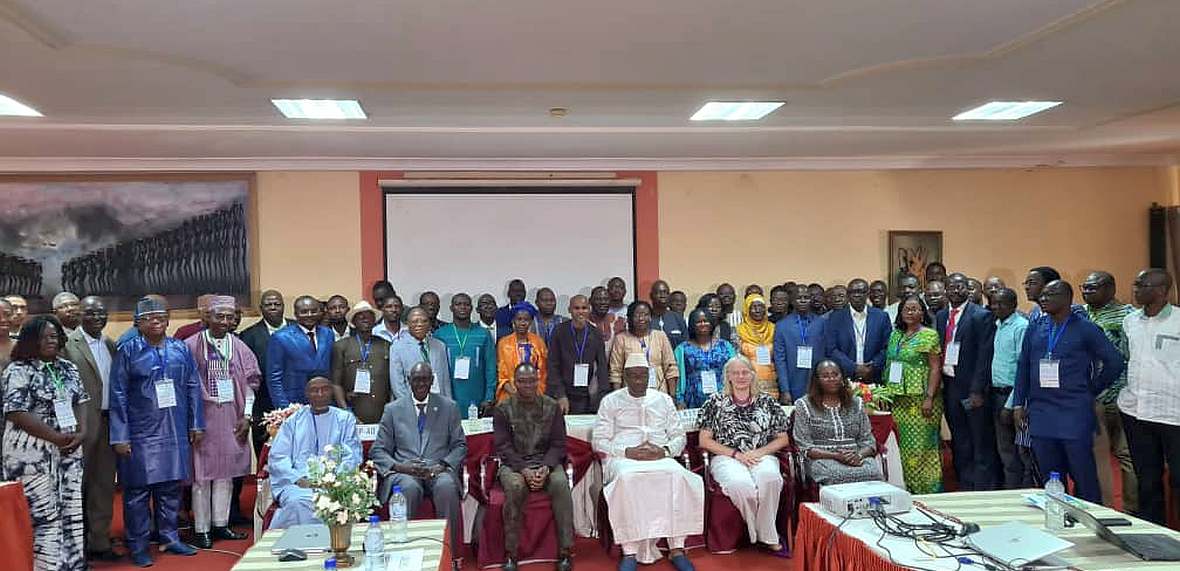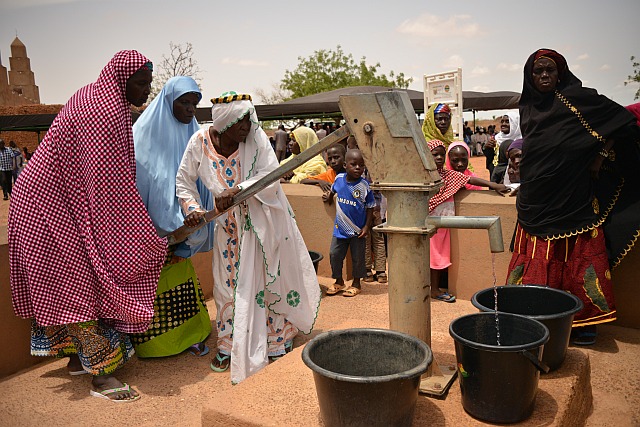 The initiative is part of the implementation of: (i) the West African Water Resources Policy (WAWRP) developed in a participatory manner by the ECOWAS Commission, the WAEMU Commission and the CILSS as well as (ii) the Common Environmental Improvement Policy (PCAE) and the Integrated Water Resources Management (IWRM) Action Plan 2019-2030 in the WAEMU Space.
The initiative is part of the implementation of: (i) the West African Water Resources Policy (WAWRP) developed in a participatory manner by the ECOWAS Commission, the WAEMU Commission and the CILSS as well as (ii) the Common Environmental Improvement Policy (PCAE) and the Integrated Water Resources Management (IWRM) Action Plan 2019-2030 in the WAEMU Space.
The main objective of the process is to advance the implementation of IWRM to ensure water security and resilient development through the promotion of innovative and successful good practices in the implementation of the IWRM approach in the WAEMU Space.
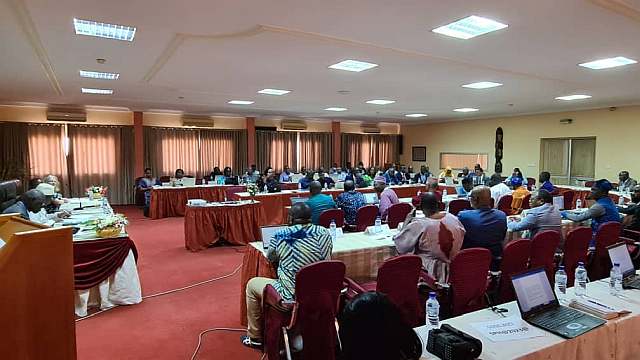 Ninety (90) participants are taking part in the Regional Forum, representing States (Benin, Burkina Faso, Côte d'Ivoire, Guinea Bissau, Mali, Niger, Senegal and Togo); Transboundary Basin Organizations (VBA, MBA, NBA, OMVS, OMVG, ANBO); and some forty state, inter-state and non-state institutions/organizations that have responded to the call and whose submitted good practices have been selected.
Ninety (90) participants are taking part in the Regional Forum, representing States (Benin, Burkina Faso, Côte d'Ivoire, Guinea Bissau, Mali, Niger, Senegal and Togo); Transboundary Basin Organizations (VBA, MBA, NBA, OMVS, OMVG, ANBO); and some forty state, inter-state and non-state institutions/organizations that have responded to the call and whose submitted good practices have been selected.
The process will run from September 2023 to the end of June 2024, and will be marked by the following four (04) main phases:
- the inventory and documentation of innovative and successful good practices in IWRM implementation in the UEMOA Space, with the organization on Tuesday, October 17, 2023 of the regional workshop to launch the call for submission of good practice proposal summaries, which will close on November 6, 2023 at 23:00 GMT;
- the holding of the Regional Forum on "Capitalization and scaling up of IWRM good practices for water security and resilient development in the WAEMU Space" from November 28 to 30, 2023 in Ouagadougou, Burkina Faso;
- large-scale dissemination of IWRM best practices from the WAEMU region through the publication of a compilation manual and at national, regional and global events;
- the development of a regional project to support the consolidation and scaling-up of innovative and successful IWRM best practices in the WAEMU region.
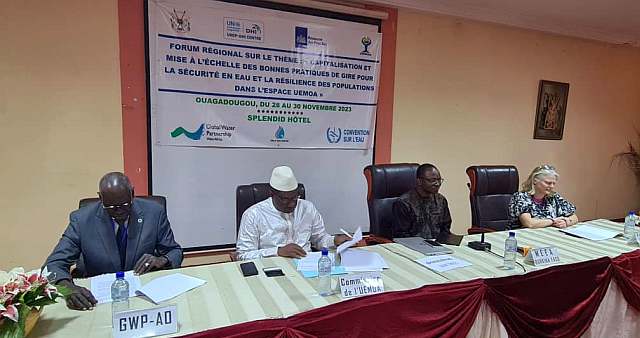 In his opening speech, read by his Secretary General, Dr Boureima KOUANDA, Burkina Faso's Minister of the Environment, Water and Sanitation declared: "The successful implementation of IWRM is essential because it puts a damper on the strong centralization of development and water resource management processes. It is above all based on decentralization, with the participation of stakeholders at all levels, so that it can enlighten all stakeholders and users of water resources".
In his opening speech, read by his Secretary General, Dr Boureima KOUANDA, Burkina Faso's Minister of the Environment, Water and Sanitation declared: "The successful implementation of IWRM is essential because it puts a damper on the strong centralization of development and water resource management processes. It is above all based on decentralization, with the participation of stakeholders at all levels, so that it can enlighten all stakeholders and users of water resources".
The acting Commissioner, Mr Mamadú Serifo JAQUITE, Commissioner in charge of the Human Development Department (DDH) informed that "This Regional Forum is intended to be biennial and is part of a process that aims to advance the implementation of IWRM for water security and resilient development; through the promotion of innovative and successful best practices in the implementation of the approach in the UEMOA Space".
For his part, the Chair of Global Water Partnership West Africa (GWP-WA) recalled: "You will recall that over the past two decades and still today, GWP West Africa has been one of the key players and partners in the training and capacity building of several cohorts of executives in the countries and at regional level, and on the proper understanding and successful implementation of the IWRM approach. It is with some pride that I speak this morning to point out, in all modesty, that we at GWP as a Global Network are at the root of the widening understanding of the IWRM approach in the region and throughout the world. This is known and accepted by all professionals in the sector".
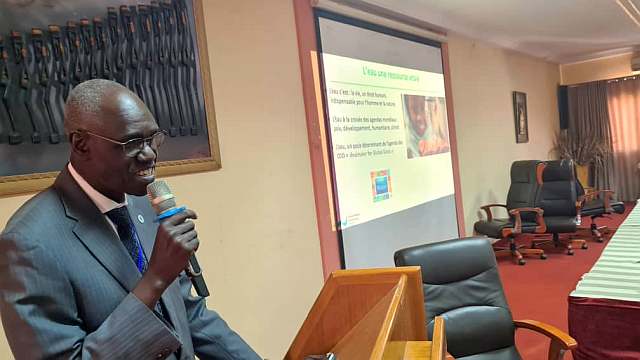 The opening address was given by the Chair of GWP-WA, Mr. Abdoulaye SENE, who highlighted the implementation of IWRM for water security and population resilience in the WAEMU region, and the 10th World Water Forum to be held from May 18 to 24, 2023 in Bali, Indonesia, with the participation of stakeholders from the WAEMU region. After recalling the stakes and challenges related to water security in West Africa, with its low rate of access to water due, among other things, to the significant gap in water infrastructure such as dams, despite the underdeveloped hydroelectric potential, he highlighted the data from the IWRM assessment of WAEMU countries, which ranged from medium-high to low, depending on the country. He concluded with a number of recommendations, including:
The opening address was given by the Chair of GWP-WA, Mr. Abdoulaye SENE, who highlighted the implementation of IWRM for water security and population resilience in the WAEMU region, and the 10th World Water Forum to be held from May 18 to 24, 2023 in Bali, Indonesia, with the participation of stakeholders from the WAEMU region. After recalling the stakes and challenges related to water security in West Africa, with its low rate of access to water due, among other things, to the significant gap in water infrastructure such as dams, despite the underdeveloped hydroelectric potential, he highlighted the data from the IWRM assessment of WAEMU countries, which ranged from medium-high to low, depending on the country. He concluded with a number of recommendations, including:
- effective planning and mobilization of short, medium and long-term investments to ensure water security at all levels;
- strengthening the political will to implement IWRM at all levels;
- promotion and strengthening of cross-sectoral coordination mechanisms and financing at all levels, with emphasis on the Water-Food-Energy-Ecosystem Nexus approach.
For the World Water Forum in Bali, the GWP-WA Chair indicated that efforts for West Africa's participation are federated under the coordination of synergies by ECOWAS, WAEMU and CILSS with GWP-WA facilitation.
